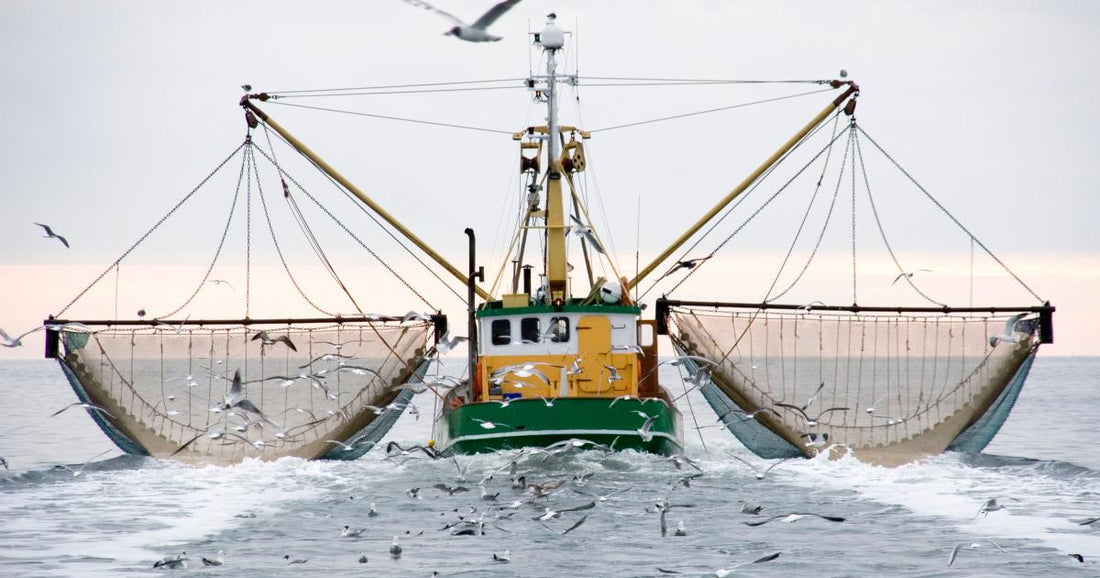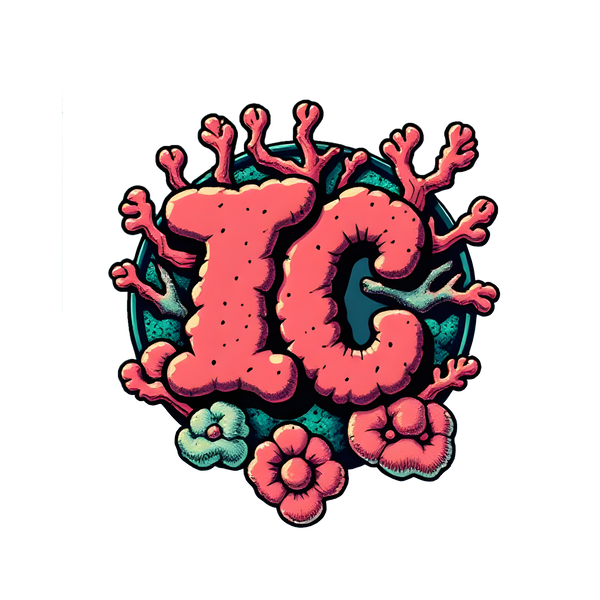
License to Gill: How Overfishing Became a Global Heist
🎣 Hooked and Hijacked: The Ocean's Biggest Heist
Imagine a bank robbery where the loot isn’t cash, but the very life of the ocean. That’s overfishing. We’re not talking about a few extra tuna on someone’s dinner plate — this is a global, industrial-scale operation draining our seas faster than they can recover.
According to the UN Food and Agriculture Organization (FAO), over 35% of the world’s fish stocks are being fished beyond sustainable limits — a figure that’s more than tripled since the 1970s. In other words, the ocean’s “bank account” is being emptied with no savings plan in sight.
Overfishing isn’t just the story of too many boats chasing too few fish — it’s also the tale of illegal operators sneaking in under the radar, governments looking the other way, and consumers (that’s us) unknowingly funding the whole operation.

A commercial trawler hauls in an enormous catch, a stark reminder of the scale of industrial fishing and its role in depleting global fish populations
🧭 Black Markets, Blue Waters
The most dangerous kind of overfishing has a name: IUU fishing — Illegal, Unreported, and Unregulated. Think of it as the black market of seafood.
IUU fishing accounts for an estimated 11–26 million metric tons of fish each year, worth up to $23.5 billion USD, according to the PEW Charitable Trusts. These aren’t small-time operations — these are well-organized fleets using false flags, forged documents, and even “dark vessels” that turn off GPS tracking to fish in protected waters.
The damage? Not just to the fish. IUU fishing steals livelihoods from small-scale fishers, undermines conservation efforts, and destroys delicate habitats like coral reefs and seagrass beds.
And while this might sound like a faraway problem, studies have shown that up to 1 in 5 fish in global markets may come from illegal sources. That means it’s entirely possible your last sushi roll had a criminal past.
💸 High Stakes, Low Ethics
When fish stocks crash, entire communities go with them. Take the collapse of Newfoundland’s cod fishery in the 1990s — 35,000 people lost their jobs overnight, and decades later, the cod population still hasn’t bounced back.

The image above illustrates the catastrophic collapse of Atlantic cod stocks off Newfoundland’s east coast in 1992—a sobering reminder of how unchecked industrial fishing can decimate a species in just decades.
Overfishing creates a ripple effect that destabilizes entire food chains. Remove too many top predators like tuna, sharks, or groupers, and you unleash population explosions of smaller species that overgraze algae-eating fish, leading to reef decline.
A 2023 report from the Marine Stewardship Council estimates that overfishing threatens the food security of more than 3 billion people worldwide who rely on seafood as a primary protein source.
Dr. Jessica Meeuwig, a leading marine ecologist at the University of Western Australia, puts it bluntly:
“The ocean is not an infinite pantry. Every time we take more than nature can replace, we’re stealing from the future.”
 The image above shows members of the Marine Stewardship Council (MSC) team at an international seafood industry event, where they advocate for sustainable fishing practices and science-based standards that protect ocean ecosystems.
The image above shows members of the Marine Stewardship Council (MSC) team at an international seafood industry event, where they advocate for sustainable fishing practices and science-based standards that protect ocean ecosystems.
🚫 Fishy Business: Who’s Fighting Back?
It’s not all doom and gloom — there’s a growing resistance to ocean crime. New tech is giving conservationists and governments an edge, from satellite tracking systems that can catch “dark vessels” to AI algorithms that flag suspicious shipping routes.
Countries like Palau have created massive marine protected areas, banning commercial fishing entirely in certain zones. Even major retailers are stepping up — companies like Walmart have pledged to source only from certified sustainable fisheries.
And here’s one big win: In 2021, the Port State Measures Agreement was signed by 100+ countries, requiring ports to block access to ships suspected of illegal fishing.

The image above illustrates the FAO Port State Measures Agreement, a global initiative to combat illegal, unreported, and unregulated (IUU) fishing by enforcing strict port inspections, documentation checks, and vessel compliance before allowing fish to be landed or transshipped.
🐠 How You Can Avoid Getting Hooked:
-
Look for MSC (Marine Stewardship Council) or ASC (Aquaculture Stewardship Council) labels when buying seafood.
-
Ask your local restaurants where their fish comes from — and if they don’t know, that’s a red flag.
-
Diversify your seafood diet; relying less on overfished favorites like tuna or salmon helps take pressure off stocks.
⚠️ Gillty Until Proven Sustainable
Here’s the thing — the fishing industry knows how to dress up its worst habits. A packet labeled “wild-caught” doesn’t mean it’s legal or sustainable. “Dolphin-safe” tuna can still come from fleets that decimate other marine species.
The Environmental Justice Foundation warns that traceability is one of the weakest links in the seafood industry. Without tight monitoring from boat to plate, it’s far too easy for illegally caught fish to slip into global supply chains unnoticed.
See the truth behind the fight against illegal fishing watch this eye-opening video and share it to keep the conversation alive.
🌊 Wear Your Protest: Join the Reef Rebellion
At Immoral Coral, we believe in turning outrage into outfit choices. Overfishing isn’t just a statistic — it’s a personal call to defend our oceans. That’s why our designs shout louder than a fishing trawler’s engine. When you wear one of our shirts, you’re sparking conversations, planting seeds of awareness, and standing shoulder-to-shoulder with people who refuse to let the ocean become a ghost town.
Your wardrobe can be your protest sign. Let’s make it impossible to ignore.
